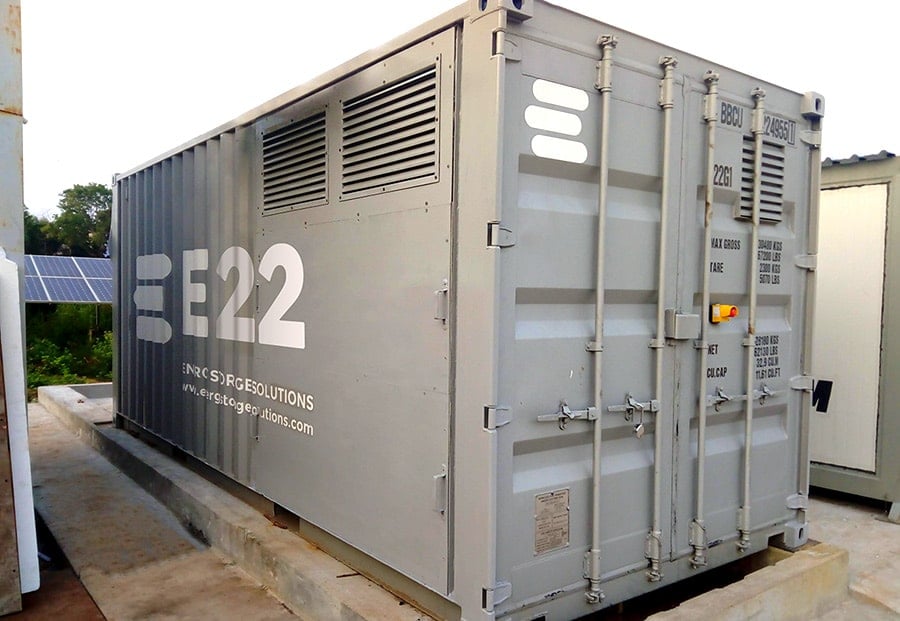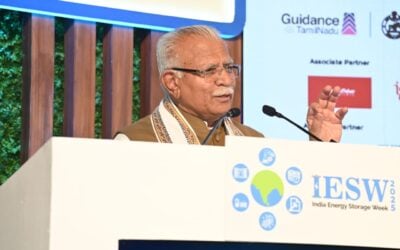
NTPC, India’s biggest electric power utility with a 76GW generation fleet, has opened a tender for a long-duration energy storage (LDES) flow battery project.
NTPC posted a tender document to its site last week (14 June), making an invitation for bids (IFB) to supply, install, commission and integrate a vanadium redox flow battery (VRFB) of 600kW output and 3,000kWh storage capacity (5-hour duration).
Enjoy 12 months of exclusive analysis
- Regular insight and analysis of the industry’s biggest developments
- In-depth interviews with the industry’s leading figures
- Annual digital subscription to the PV Tech Power journal
- Discounts on Solar Media’s portfolio of events, in-person and virtual
The system would be deployed at NTPC’s R&D centre, NTPC Energy Technology Research Alliance (NETRA), which is in the Greater Noida region of Uttar Pradesh, India.
NETRA was set up in 2009, focusing on in-house technology development as well as collaborative research activities. Ongoing projects include carbon dioxide capture from flue gas produced by coal-fired power plants for conversion to methanol, solar PV and battery microgrids and high-pressure steam electrolysis for hydrogen generation.
Vanadium redox flow batteries are a contender for providing bulk electrochemical storage of energy at large capacities and longer durations versus lithium-ion (Li-ion) batteries, enabling the decoupling of energy and power at stack level.
In other words, to scale up the capacity of a flow battery, the system’s liquid electrolyte tanks can be increased in size, whereas with Li-ion, additional battery stacks need to be added, with attendant increases in cost and footprint as additional balance of plant (BOP) equipment such as inverters or power conversion systems (PCS) must be added. Vanadium flow batteries are also decoupled from supply chains for lithium-ion.
Therefore, while NTPC’s VRFB tender is much smaller in size than the company’s recent Li-ion battery energy storage system (BESS) solicitations (a 500MWh tender for standalone Li-ion BESS is currently ongoing), it represents an R&D effort to evaluate the flow battery technology.
‘Start of something big’
As with other parts of the world, VRFBs are at an earlier stage of commercialisation in India than lithium-ion BESS or pumped hydro energy storage (PHES).
Only a handful of examples of installed projects exist in the country, such as a 50kW/200kWh VRFB provided by Spain-headquartered E22 to state-owned enterprise Bharat Heavy Electricals Limited (BHEL) commissioned in Hyderabad in 2022.
Vishal Mittal, founder of Deletrik Systems, thought to be the only VRFB OEM headquartered in India at present, welcomed the NTPC tender as the first of its kind at MWh scale in India.
“This could be start of something big and go a long way in meeting India’s domestic BESS requirement of 236 GWh by 2031-32 as per the National Electricity Plan projection,” Mittal wrote on networking site LinkedIn yesterday.
NTPC is seeking bidders which have been substantially involved in the delivery of VRFB systems from a manufacturer perspective, with a cumulative capacity of 2,400kWh in one to five orders over the past 10 years. Manufacturers should provide evidence of at least one reference project of 400kWh or larger in operation for at least six months ahead of the tender’s opening for bids on 9 July 2024.
EPC firms taking part should partner with VRFB manufacturers and have delivered a grid-connected solar PV project or off-grid solar-plus-storage hybrid project with a value of more than IR114 million (US$1.37 million), in operation for at least six months prior to bid open.
Invinity wins EDF Renewables North America flow battery contract for microgrid
In related news, Anglo-American VRFB provider Invinity Energy Systems this week (17 June) announced a 4MWh sale to EDF Renewables North America subsidiary PowerFlex in California.
18 Invinity VS3 VRFB units will be deployed at a solar PV microgrid project for the indigenous community Rincon Band of Luiseño Indians, at its Harrah’s Resort Southern California resort complex, paired with new and existing solar PV capacity.
The project is among a number of similar projects for Tribal communities being funded through the California Energy Commission (CEC), with Invinity involved in some of the others, aimed at giving communities greater energy resilience and higher integration of renewable energy. Projects are based on a variety of energy storage technologies including lithium-ion and flow batteries, with a significant component around funding for novel LDES technologies.
Invinity recently announced an expansion in manufacturing capacity in Scotland, UK, where it will build a new assembly plant for its VRFBs, as well as expanding an existing cell stack production plant. This will bring its annual flow battery production capacity in the UK to more than 500MWh, while the firm also has a 200MWh annual production capacity factory in Canada.
This article has been amended to reflect accurately Invinity’s Canadian production capacity.






